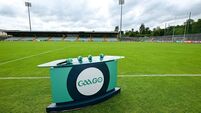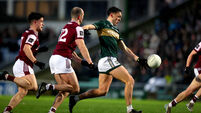Trevor Mortimer: Out of Africa, and back in Mayo’s melting pot

revor Mortimer was no jilted boyfriend. Inter-county football didn’t dump him; he dumped it. It may have been a nine-point All-Ireland semi-final defeat to Kerry that he bowed out on but, at 31, there was still stuff in the tank. His versatility, experience but above all else honesty made him relevant. It’s just life outside the game had taken a turn for the worse.
The family’s long-standing quarry business outside Tuam had become a drudge. The economy had robbed its soul. Mortimer was charged with the unenviable task of chasing outstanding accounts. “Towards the end my job was knocking on people’s doors and trying to collect money owed to us. And that wasn’t very successful. People didn’t have it – what could you do? My dad (Frank) told me last week we still have a client paying €40 a month since seven years ago. Genuinely, people are still trying but it was a genuinely tough job. You were trying to get something off people they didn’t have.”









